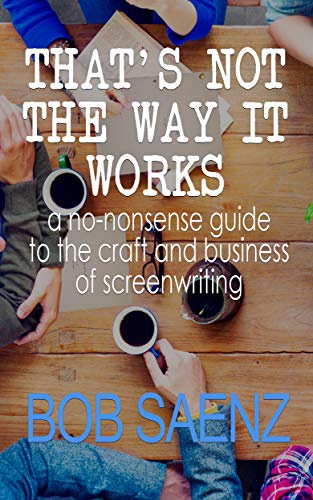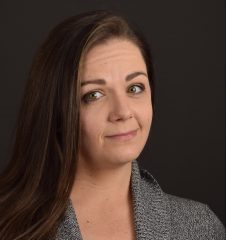“That’s Not The Way It Works” Screenwriting Book Review
Review of Bob Saenz’s That’s Not The Way It Works: A no-nonsense guide to the craft and business of screenwriting


Why do we recommend this book?
This is one of the very few books on screenwriting actually written by a professional working screenwriter, with produced credits, who has worked in the industry on a consistent basis for many years. You may be surprised to learn that this is rare amongst the screenwriting books that land on your film school’s “must reads” and top books on Amazon. However, the truth is there are many “gurus” out there telling you how to be successful when they’ve never attained that success themselves. So when we find a book written by a successful screenwriter like Bob, we recommend reading it.
“Bob Saenz has a dozen plus produced credited films. He’s optioned or sold multiple scripts and one TV pilot to production companies, producers, and studios. He does for hire rewrites, adaptations, and polishes for producers / production companies.”
As the cover of the book indicates, this is a no-nonsense guide to the craft and business of screenwriting. In his unique witty voice, Bob reveals the ins and outs of the industry when it comes to building a career in screenwriting. His book does what most other books don’t, speak from personal experience.
“So, You Want to Be a Screenwriter.”
The first chapter of Bob’s book is aptly titled “So, You Want to Be a Screenwriter.” Throughout the book he challenges every person that dreams of being a screenwriter to open their eyes to the reality that is the business of screenwriting. It may not be what you want to read, but we strongly encourage you to pick it up because it will make you face the truth of being a screenwriter head on. Maybe you just like the idea of writing movies and television. Well, it takes a lot of work. Just ask Bob.
“New writers are anxious to hop on, in the front seat if they can, anticipating that rise, their arms thrust up high, thinking the exhilarating ride will be nothing but joy with bags of money tossed on board as the ride takes them to red carpets with cameras flashing. Except that’s not the way it works. Reality? The ride is long and hard. It’s powered by your creativity, your hard work, your determination, endless patience, skill, networking, and your ability to endure a wide array of emotions. How you handle the highs with humility, knowing they won’t last, and your ability to survive the subterranean valleys will determine how you survive it.”
So is this one of those cynical books that just tells you how hard it is to attain your dreams?
Not at all.
Bob encourages you to ignore the so-called “rules of screenwriting” while also giving helpful advice about tips and tricks he’s used to write excellent scripts throughout his career. His book is filled with wisdom that can only be shared because of years of experience in the film industry. However, it’s important for him to dispel the myths and misunderstandings of how the business works first before you can learn how to succeed.
The Myth of Instant Success:
This common myth leads to aspiring screenwriters giving up after a few months or a few nos. Bob explains that it takes years before your work might get noticed and even then, the work doesn’t stop there.
“Want to know how long? It’s not weeks or months. You need to start thinking years. Every successful writer has endured this, and they succeeded by not giving up. There is no instant gratification. There are no overnight successes. Every success story spent a lot of time becoming that overnight success.”
The Myth of “No Notes”:
Maybe this is less of a myth and more of a naive hope, but the one of the hardest truths to swallow in this book is when he talks about the notes you will receive on your scripts. Whether you are giving them to yourself or someone involved in the collaborative process of your script’s development, he explains:
“Nothing in your script should be sacred. You have to be of the mindset that there’s nothing in your script that can’t be deleted, changed, or replaced. If you make your mind up that this is the case, it’s easier to be open to making your work much better. Truth is, things you take out now are things you might put back on the next rewrite. Not necessarily in the same place in the script either. You need to learn now, editing yourself, that anything can change in a script, so the shock of it when you get producer notes in the future isn’t fatal to your career.”
This is something we’ve learned personally in our writing career. We can’t hold things too close or dear to our hearts because if we don’t change it, they’ll hire someone else that will. There are some notes where you can explain the ripple effect they will have on the story or why they won’t work. However, at the end of the day if they don’t budge, you will have to apply them or get fired.
As he further explains:
“It’s never personal. It’s strictly about the material. Problem is, the material is personal to you. So, it’s very hard sometimes. You have to hang in and remember your goal, a produced film with your name on it. That always made getting notes easier for me. How you respond to notes will have a great deal of influence on your career and maybe if you’ll have one at all.”
“How Not to Market Your Script”:
This chapter is one of the best in terms of behind the scenes knowledge and cautionary comedy. Bob explains the ways that real people tried to market their scripts in the film industry. The methods range from things I probably would’ve tried if I didn’t know how the industry works to plain idiotic.
If these writers had put half as much creative energy and hard work into their actual script instead of how they planned to get it to executives, maybe they would have careers today. I might be bias since I write primarily comedy, but I think the book is worth purchasing for this chapter alone. There’s one story near the end involving a leather briefcase that was so insane it made me put the book down and read it to Anthony. It was so hilarious, I wish it would be in a film about someone trying to become a screenwriter. Please Bob, put this in one of your films, or let us…
This comedic chapter aside, his advice on writing to budget, marketing your script, networking, sales/options, and rejection is invaluable. He goes over the different pitfalls to avoid when it comes to these areas in the business of screenwriting. These are lessons you can learn from Bob by reading his book or learn the hard way after years of no one buying your script or wanting to work with you. The choice is up to you.
“Well, Do You Still Want to Be a Screenwriter?”
Bob expertly finishes his book with the chapter: “Well, Do You Still Want to Be a Screenwriter?” A question you’ll be better equipped to answer after reading his book. He encourages those of us who really want this career to not give up. If you can handle the truth about how hard it is to be a screenwriter then keep writing, because it’s worth it.
So, if you’re just starting out or even if you’ve had years without success, there’s a good chance you are naive to how this business works. Here’s your chance to gain wisdom from someone who knows what they are talking about. We highly recommend it.
BUY IT HERE:
That’s Not The Way It Works: A no-nonsense guide to the craft and business of screenwriting
Bob is also active in the private Facebook screenwriting group here: Screenwriting
He regularly answers questions about once a week when he takes a break from writing. Just look for his posts in the group.
What other screenwriting books do we recommend?
Books with advice from professional working screenwriters:
Kill the Dog by Paul Guyot and The 101 Habits of Highly Successful Screenwriters
